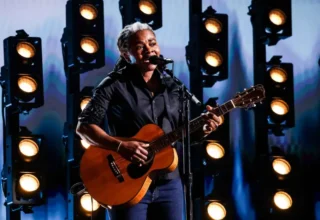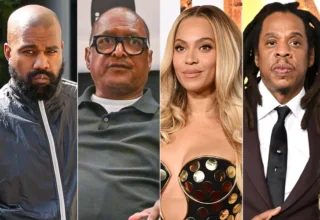
Ever since Taylor Swift appeared last September at a Kansas City football stadium, with a Chiefs jacket artfully shrugged off her shoulders, large swaths of the nation (I know, not you) have quietly or loudly lost their minds.
Here was the fulfilling of the prophecy foretold in “You Belong With Me,” in which Swift was, in fact, on the bleachers, and this time the guy finally realized he did belong with her. Here was the merger of two major fandoms. Here was Megyn Kelly giving her two cents on the couple, and Donald Trump giving his, and Howard Stern proclaiming that Travis Kelce should marry Swift, and my old friend, a literal ordained priest, texting me to say, “If 20 years of listening to the ups and downs of Taylor Swift’s love life ends with her marrying a football player, I am going to be so p—ed.”
By last week, relationship analysis had reached the truly upside-down place, with the launching of an outlandish theory on the right that the entire Traylor romance was part of a plot to win the 2024 election for President Biden.
There is clearly something going on here that has touched a nerve.
Now that Taylor has won her 13th and 14th Grammy, and now that the Japanese embassy has sent out a formal press release assuring that she can make it back from her Tokyo concert in time to watch her boyfriend play in the Super Bowl, maybe we can figure out what it was.
I keep thinking of Joseph Campbell, the renowned professor of folklore whose works brought terminology like “the hero’s journey” and “follow your bliss” to the masses. He died in 1987, but if he was alive I think he would have a lot to say about what is happening here.
Even those of us who don’t follow any kind of stadium culture — sportsball, concert — can observe that the Swift/Kelce union represents a fairy tale, a love story in the classic genre. Boy adores girl from afar. He plots a meet cute, and it works! Campbell taught that in terms of culture-shaping, mythology has four functions, the highest of which is that it reveals “how to live a human lifetime under any circumstances.” Traylor is doing this for us: it is giving us the ingredients of a universal love story, played out by the closest thing we have to demigods in the 21st century.

So why do so many people seem to have a problem with it? I think it has something to do with the fact that their relationship both is, and isn’t, a conservative fairy tale.
Another purpose of mythology, according to Campbell, is to “support and validate a certain social order.” The Traylor fairy tale outwardly looks very specifically like a validation of a conservative social order. The relationship is the fulfillment of every heteronormative fantasy: a beautiful red-state blonde, who identifies as a Christian, falls for a handsome man whose masculinity is uncontested. Who has, in fact, built his capitalist fortune off his physical prowess in a uniquely American sport. No wonder my friend is so nonplussed: This relationship seems so basic, it’s practically retrograde. It should be fawned over by every OAN host, memed by every sophomore at Liberty University.
Only somehow, it’s not, because something has gone horribly wrong with the fantasy. It turns out the beautiful blonde — who grew up on an actual Christmas tree farm — is somehow not interested in being a right-wing poster girl. It turns out she’s pro-choice, and pro-LGBTQ rights, and anti-Marsha Blackburn. What’s more, Swift has said that her political views actually are Christian values, and her faith has informed her beliefs. It turns out that Travis Kelce is pro-Covid vaccine, a Pfizer spokesman encouraging Americans to get boosted for both coronavirus and the flu, calling it “the right thing to do.” It turns out that Travis is happy to fly all the way to Argentina so that he can be the one in the bleachers, fangirling over his successful girlfriend.
Conservatives should have had this one in the bag. They do not have this one in the bag. Because it turns out that the myth of Traylor supports a different kind of social order. A newer, more modern one — mutually supportive, even feminist.
And so there’s something for everyone to like in their relationship. But, more importantly (this is The Discourse after all), there’s something for everyone to dislike.
It’s been interesting to me to follow the mixed reception of this relationship alongside the much more universally beloved relationship between the other Kelce brother, Jason, and his wife, Kylie. Those Kelces gained broader fame in an Amazon documentary last year following Jason as he weighed his retirement from the Philadelphia Eagles. While Kylie was herself an elite college athlete, in her married life her primary roles have been to raise the three children she shares with Jason — which she appears to do in a cheerfully non-Pinterest way — and to be an advocate for girls’ participation in sports.

She appears, in other words, to be living an admirable and worthy life, which also has the trappings of a more traditional life. She has voluntarily taken a back seat to her husband’s uniquely demanding career. This is the kind of football marriage that we’re used to: The jock husband handles business on the field; his formidable wife handles the blocking and tackling on the home front. In the closest thing this couple has experienced to a public controversy, Jason last year showed up at the premiere of his own documentary in gym shorts. In the podcast he and Travis co-host, he later explained “I was gonna have jeans on, but … Kylie was gonna bring the jeans. Kylie was late.”
Travis, whose affection for his sister-in-law is well documented, responded, “Why didn’t Jason bring jeans for Jason?”
This is what I’m talking about. In the Traylor fairy tale, the man doesn’t “wear the pants” in the traditional sense. He certainly may wear pants, if he chooses — he just has to pack them for himself.
I don’t think that people obsessing over Taylor and Travis are vapidly obsessing over celebrity. I think that they are trying to make sense of the world they live in, as humans have done since the beginning of civilization. I think part of what they are doing is examining the pop star and the football player for signs that the social order is either intact and strong, or changing and evolving.
Or both — because it’s always both. The social order is moving in both directions, in different ways: progress, novelty and open-mindedness tugging against convention, anxiety and inherited expectations.
America’s metaphorical homecoming queen might cheer on the sidelines for her football star boyfriend, and then she might go ahead and endorse Joe Biden, and then she may send us all secret messages in “The Tortured Poets Department,” and an election will happen, and in 20 years they’ll either have broken up or have three kids, and either way we’ll always have the winter of 2024 and the powerful fairy tale that distracted us from everything else that the future had in store.







